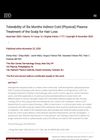 1 citations,
October 2022 in “Annual review of cell and developmental biology”
1 citations,
October 2022 in “Annual review of cell and developmental biology” The nervous system helps control stem cell behavior and immune responses, affecting tissue repair and maintenance.
 1 citations,
September 2022 in “Molecules”
1 citations,
September 2022 in “Molecules” Fructus Malvae may help with diabetes, tumors, and hair loss due to its various active compounds.
 1 citations,
June 2022 in “Pakistan biomedical journal”
1 citations,
June 2022 in “Pakistan biomedical journal” Pumpkin seeds are nutritious and can improve health, making them useful for cheaper, sustainable food.
 April 2024 in “Journal of translational medicine”
April 2024 in “Journal of translational medicine” Melanocytes are important for normal body functions and have potential uses in regenerative medicine and disease treatment.
 November 2024 in “Applied Sciences”
November 2024 in “Applied Sciences” Wild strawberry waste extract can be a sustainable cosmetic ingredient for treating acne and hair loss.
 November 2024 in “Frontiers in Medicine”
November 2024 in “Frontiers in Medicine” Cirrhosis affects quality of life with various symptoms, requiring a holistic, multidisciplinary approach for management.
 August 2024 in “Applied Sciences”
August 2024 in “Applied Sciences” Plant extracts may help prevent or reverse hair graying.
May 2024 in “Journal of Fungi” Tinea capitis in adults, especially postmenopausal Black women, needs prompt treatment with oral antifungals to avoid scarring.
May 2024 in “Molecules/Molecules online/Molecules annual” Plant extracts can help prevent hair loss and promote hair growth.
 March 2024 in “Nutrients”
March 2024 in “Nutrients” Gynostemma pentaphyllum and its component damulin B could help hair grow by activating certain cell pathways.
 February 2024 in “Scientific Reports”
February 2024 in “Scientific Reports” The wolves suspected of man-eating in the 1880s likely ate very little human flesh and mostly consumed a diet similar to herbivores and omnivores.
 December 2023 in “The journal of cell biology/The Journal of cell biology”
December 2023 in “The journal of cell biology/The Journal of cell biology” The mTurq2-Col4a1 mouse model shows how the basement membrane develops in live mammals.
 November 2023 in “International Journal of Medical Sciences”
November 2023 in “International Journal of Medical Sciences” New regenerative medicine-based therapies for hair loss look promising but need more clinical validation.

Nanocarriers with plant extracts show promise for safe and effective hair growth treatment.

New treatments for hair loss should target eight main causes and use specific plant compounds and peptides for better results.
 July 2023 in “Biomolecules”
July 2023 in “Biomolecules” The new "whisker follicle microinjection assay" can test how different biomolecules affect hair growth and color.
 July 2023 in “International Journal of Cosmetic Science”
July 2023 in “International Journal of Cosmetic Science” Biopolymers are increasingly used in cosmetics for their non-toxicity and skin benefits, with future biotech advancements likely to expand their applications.
 May 2023 in “Frontiers in Cell and Developmental Biology”
May 2023 in “Frontiers in Cell and Developmental Biology” The document concludes that using stem cells to regenerate hair follicles could be a promising treatment for hair loss, but there are still challenges to overcome before it can be used clinically.
 February 2023 in “Frontiers in Endocrinology”
February 2023 in “Frontiers in Endocrinology” Too much male hormone in mothers can negatively affect the sexual behavior of both male and female baby mice.
 September 2021 in “Medicina estética”
September 2021 in “Medicina estética” Sabal serrulata and biomimetic peptides with microneedling reduced hair loss and improved hair thickness in men with balding.
 July 2021 in “IntechOpen eBooks”
July 2021 in “IntechOpen eBooks” Ginseng, especially its component ginsenosides, can promote hair growth, reduce hair loss, and potentially treat conditions like alopecia by affecting cell pathways and cytokines.
 January 2017 in “Journal of Investigative Dermatology Symposium Proceedings”
January 2017 in “Journal of Investigative Dermatology Symposium Proceedings” The 2015 Hair Research Congress concluded that stem cells, maraviroc, and simvastatin could potentially treat Alopecia Areata, topical minoxidil, finasteride, and steroids could treat Frontal Fibrosing Alopecia, and PTGDR2 antagonists could also treat alopecia. They also found that low-level light therapy could help with hair loss, a robotic device could assist in hair extraction, and nutrition could aid hair growth. They suggested that Alopecia Areata is an inflammatory disorder, not a single disease, indicating a need for personalized treatments.
April 2007 in “CRC Press eBooks” Certain vitamins in wrong amounts, alcohol abuse, metals, and other toxins can cause serious brain and nerve damage.
March 2023 in “Anais Brasileiros De Dermatologia” Topical minoxidil is the best-supported treatment for female hair loss, but personalized plans are needed.
 4 citations,
January 2015 in “Journal of microbial & biochemical technology”
4 citations,
January 2015 in “Journal of microbial & biochemical technology” Biotin helps regulate proteins in the blood, which may explain its role in hair growth.
88 citations,
August 2014 in “PLOS genetics” Syndecan-1 is essential for maintaining skin fat and preventing cold stress.
 15 citations,
February 2014 in “BMC Research Notes”
15 citations,
February 2014 in “BMC Research Notes” The X5 Hairlaser might help treat male hair loss, but more research is needed.
 15 citations,
January 2003 in “Lasers in Surgery and Medicine”
15 citations,
January 2003 in “Lasers in Surgery and Medicine” Cold air and a chilled sapphire window both protect the skin during laser treatments, and work better with water or gel, especially for darker skin.
6 citations,
December 2016 in “Journal of Obsessive-Compulsive and Related Disorders” Adults with trichotillomania do not have different pain sensitivity to cold pressor pain compared to healthy individuals.
 3 citations,
November 2020 in “Journal of Drugs in Dermatology”
3 citations,
November 2020 in “Journal of Drugs in Dermatology” Cold plasma treatment for hair loss was well tolerated and showed improvement in most patients.
























